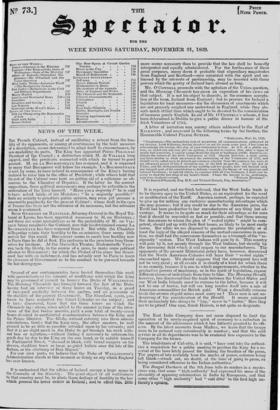It is reported, and we think believed, that the West
India trade is to be thrown open to the United States, as an equivalent for the recal or modification of the Tariff'. America cannot, perhaps, be expected to give up for nothing any exclusive manufacturing advantages which she may possess ; but if any credit be due to the American press, the Tariff has been productive to her manufacturers of any thing but ad- vantage. It seems to be quite as much for their advantage as for ours that it should be rescinded as fast as possible, and that those among the Americans to whom the plea of " vested rights " might be com- petent, should put up with their first losses, as likely to be most easily borne. But while we are disposed to question the probability or at least the logic of the alleged reasons of the mutual concessions in ques- tion, we shall hail the concessions themselves as a triumph of the " ciprocity " system. The West Indians will gain by it. This country will gain by it, not merely through the West Indians, but directly by the increasing field which it will reopen to our manufacturers. The opponents of the present Ministerial policy have, however, discovered that the North American Colonies will haye their " vested rights" encroached upon. We should suppose that the consequent loss will not be very great ; at all events it is clearly of a kind for which there is no remedy, because it is one to which improvements, whether in the productive powers of machinery, or in the spirit of legislation, expose different classes of individuals from time to time. The Morning Herald, however, has discovered that the trade between the United States and our West India Islands must be ruinous to the latter, because it will not be one of barter, but will ere long resolve itself into a sale of American commodities for British gold. What a dreadfully ruinous trade the owners of gold mines must carry on ! Their case is not un- deserving of the consideration of the Herald. It seems ordained their melancholy fate always to " buy," never to " barter." How they are to be pitied ! Our case, thank Heaven, is not quite so desperate. •


















